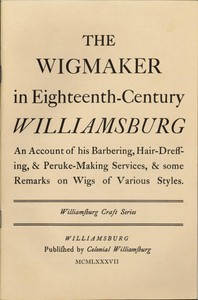The Wigmaker in Eighteenth-Century Williamsburg by Bullock and Tonkin
Read now or download (free!)
| Choose how to read this book | Url | Size | ||||
|---|---|---|---|---|---|---|
| Read online (web) | https://www.gutenberg.org/ebooks/58384.html.images | 104 kB | ||||
| EPUB3 (E-readers incl. Send-to-Kindle) | https://www.gutenberg.org/ebooks/58384.epub3.images | 1.7 MB | ||||
| EPUB (older E-readers) | https://www.gutenberg.org/ebooks/58384.epub.images | 1.7 MB | ||||
| EPUB (no images, older E-readers) | https://www.gutenberg.org/ebooks/58384.epub.noimages | 105 kB | ||||
| Kindle | https://www.gutenberg.org/ebooks/58384.kf8.images | 1.7 MB | ||||
| older Kindles | https://www.gutenberg.org/ebooks/58384.kindle.images | 1.7 MB | ||||
| Plain Text UTF-8 | https://www.gutenberg.org/ebooks/58384.txt.utf-8 | 77 kB | ||||
| Download HTML (zip) | https://www.gutenberg.org/cache/epub/58384/pg58384-h.zip | 1.5 MB | ||||
| There may be more files related to this item. | ||||||
About this eBook
| Author | Bullock, Thomas K. |
|---|---|
| Author | Tonkin, Maurice B. |
| Contributor | Townsend, Raymond R. |
| Editor | Ford, Thomas K. |
| Title |
The Wigmaker in Eighteenth-Century Williamsburg An Account of His Barbering, Hair-dressing, & Peruke-Making Services, & Some Remarks on Wigs of Various Styles. |
| Alternate Title | The Wigmaker in 18th-Century Williamsburg |
| Series Title | Williamsburg craft series |
| Credits |
Produced by Stephen Hutcheson and the Online Distributed Proofreading Team at http://www.pgdp.net |
| Summary | "The Wigmaker in Eighteenth-Century Williamsburg" by Bullock and Tonkin is a historical account published in the late 20th century that explores the craft of wigmaking and barbering in Colonial Williamsburg during the 18th century. This book delves into the life of Richard Gamble and his peers, shedding light on their roles as barber-wigmakers, the societal significance of wigs, and the cultural norms surrounding grooming in this era. The narrative follows the life and business of Richard Gamble, who faced numerous legal battles over unpaid debts, a common plight among craftsmen in colonial Virginia. After his partnership with Edward Charlton, who eventually took over the business, the book outlines the various wig styles popular at the time and the intricate process of wigmaking. Through court records and surviving account books, the authors provide insights into the clientele, including prominent figures like Thomas Jefferson and Peyton Randolph, who patronized wigmakers for their grooming needs. Additionally, the text reflects on the societal implications of wig fashion, portraying how wigs served as a status symbol within the intricate social structure of colonial Williamsburg. (This is an automatically generated summary.) |
| Language | English |
| LoC Class | GT: Geography, Anthropology, Recreation: Manners and customs |
| LoC Class | TT: Technology: Handicrafts, Arts and crafts |
| Subject | Wigmakers |
| Subject | Wigs -- History |
| Category | Text |
| EBook-No. | 58384 |
| Release Date | Nov 30, 2018 |
| Copyright Status | Public domain in the USA. |
| Downloads | 162 downloads in the last 30 days. |
| Project Gutenberg eBooks are always free! | |

